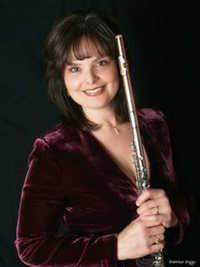by Mike Telin

Johnson, who is based in the Washington DC area and serves on the faculty at the Levine School of Music and St. Mary’s College in Maryland, has a way of communicating even the most complicated musical rhetoric in down-to-earth terms. And this admirable trait was in evidence as she explained Lukas Foss’s use of extended techniques in his Three American Pieces (for flute and piano), which opened the program. Originally written for violin in 1944, the composer revised the work at the request of flutist Carol Wincenc in 1986. The first two movements, Early Song and Dedication, were performed with charm and sensitivity and Johnson made easy work of the technically challenging final movement, Composer’s Holiday.
Following a velvety performance of Joseph Schwantner’s beautiful Black Anemones, Johnson and Rodriguez dug into Robert Muczynski’s Sonata for flute and piano. Written in 1961, the work was once a standard of the flute recital repertoire, and it was good to have the chance to hear it again, especially in the hands of technically solid musicians.
In his an evolving romance, Jeffrey Mumford shows the quiet and gentler side of his compositional pallet. The players gave a nuanced performance of the lyrical, neo-classical work.
Carlos Rodriguez was given his moment on stage alone during performances of Manuel Ponce’s Intermezzo and Alberto Ginastera’s Malambo. Like Johnson, Rodriguez is also a charismatic speaker who has technical chops to spare. During both pieces he made the most difficult passages sound easy, although more dynamic contrasts and color changes would have been nice. Rodriguez showed his skills as an improviser during Café 1930 and Bordel 1900 from Astor Piazolla’s popular L’Histoire du Tango. Written for flute and guitar, Rodriguez skillfully improvised from the guitar score which added a clever spontaneity that is usually lacking in performances of the piece and the audience acknowledged their appreciation with a deserved ovation.
As an encore, Johnson and Rodriguez played a jazzed-up version of Amazing Grace, a piece that in any arrangement is sure to please the listener.
Published on ClevelandClassical.com March 26, 2013
Click here for a printable version of this article.



